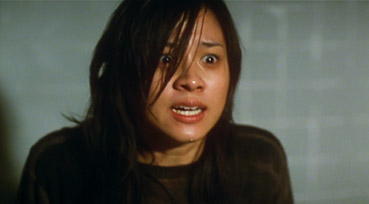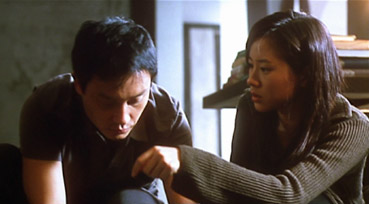|
The
opening few minutes of Lo Chi-Leung's Inner Senses [Yee do hung gaan] are almost guaranteed
to prompt quiet groans of recognition from anyone who knows
their way round the J-Horror sub-genre, which despite its Hong
Kong origins this film initially appears
to be very much a part of. A nervous-looking and uncommunicative
girl named Yan is shown round a new apartment, which she
agrees to rent, and almost immediately starts seeing what
looks like the living dead. A short while later she's in
the office of young psychiatrist Jim Law and revealing that
she regularly sees ghosts. So that's it, huh? She sees dead
people. We've seen this all before, surely. Do we really
need to see it again?
Or
have we? Components may be familiar, but they are not assembled
into quite the expected package. The doubting doctor/psychiatrist
is a familiar figure in horror cinema, there to be convinced
that ghosts really do exist or that this child really is
possessed by the devil, and the audience knows from the
start that his attempts to explain it all away as repressed
memories will eventually be shown to be misguided. The difference
here is that you soon suspect that he might actually be
right. From his very plausible lecture on why we believe
we see ghosts when none are there, delivered as much for
the benefit of the audience as his students, the charismatic
Leslie Cheung makes Jim a likeable and persuasive figure. He knows his stuff and he genuinely cares for his patient,
and you thus find yourself willing for him to be right. But is he? As
played by Kar Yan Lam, the troubled Yan is similarly convincing,
and by taking a cinematically subjective approach, director
Lo Chi-Leung allows us to see what she sees and in the process exposes
us to some of the spookiest visions and best jolts I've
seen in a horror film for some time (it is worth noting,
however, that the best shock of all has nothing to do with
supernatural apparitions, but an assault by an angry parent).

Impressively
low key handling and excellent central performances make
the developing relationship between Jim and Yan the dramatic
core of the film, one that lifts it above the more recent
pack of often derivative J-Horror knock-offs. The emphasis
on the psychological over the supernatural makes for a refreshing
change and allows the plot to develop along unexpected lines,
with rational explanations provided for seemingly paranormal
phenomena and a startling inversion of roles two-thirds
of the way in, a narrative flip-over hinted at earlier that
still caught me by surprise. More
than once Lo steps onto a tightrope and maintains a precarious
balance – the falling-in-love musical montage that never
becomes saccharine; the multiple climactic visions that
stop just short of excess; the borrowings from Nakata
Hideo and the Pang brothers that are inventively developed – resulting
in a work that slots comfortably into its sub-genre but
whose qualities enable it to stand out from an increasingly
busy crowd.
Research
suggests that although Inner Senses has
its supporters, the general consensus is "nice try,
but not quite there." I have to disagree. I've seen
quite a bit of J-Horror (and, K-Horror and HK-Horror if
you want to be picky) recently, and watched this film on
a double bill with Lee Woo-Cheol's more frequently acclaimed Cello, which for my money was more derivative
and less inventive than Lo's film. Even if you are becoming
weary of the J-Horror formula,
then give Inner Senses a look – despite
its borrowings, it has solid ideas of its own, is well written
and very well performed, and ghosts or no ghosts, it still
delivers on the chills.
This was, for those who do not know, the final screen performance
of the always impressive Leslie Cheung, a widely respected
and successful actor and singer and veteran of 58 films,
including A Better Tomorrow (1986), A
Chinese Ghost Story (1987), A
Better Tomorrow II (1987), Days of
Being Wild (1991), Farewell My Concubine
(1993), Ashes of Time (1994) and Happy
Together (1997). A year after completing Inner
Senses he committed suicide by jumping from the
Mandarin Oriental Hotel in Hong Kong's main business district
while suffering from depression, a death that devastated
the Hong Kong community. With that in mind, the climax of
Inner Senses is a particularly creepy one,
acting almost as a premonition of real world events to follow.
I've
remarked before that J-Horror films rarely appear in pristine
form on UK DVD, and despite its Hong Kong origin, Inner
Senses is no exception. Although an anamorphic
transfer, the picture is slightly soft and the colours not
quite right, suggesting an NTSC to PAL conversion somewhere
down the line. It's still a very watchable transfer, but
could have been better.

The
usual Tartan trio of Dolby 2.0 stereo, 5.1 surround and
DTS surround are on offer, and as with any modern horror
film worth its salt, sound plays a key part in the atmosphere
and scares here, so 5.1 and DTS are definitely the way to
go. That said, the volume differential between dialogue
and made-you-jump bangs is very large, so be prepared for a start if you like your dialogue loud.
Not
too much here. The Trailer (1:41)
has too much of the final scene for my liking, but is otherwise
a serviceable sell.
Behind
the Scenes (11:25) finds us in EPK territory,
an extended and not that interesting sell for the press
and potential distributors, with film extracts intercut
with cast members telling scare stories in character and
some only slightly more insightful contributions from co-scriptwriter
Derek Yee and director Lo Chi-Leung.
An
underrated psychological thriller that deserves recognition
beyond its status as the final film of one of Hong Kong's
most respected and talented stars. Tartan's DVD does better
on sound than on picture, and the extra features are not
up to much, but the film itself still makes this one well
worth a look.
|